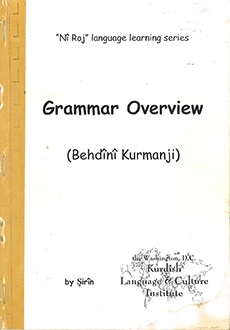|
INTRODUCTION
This Grammar Overview was written primarily for English speakers who are learning the Behdînî Kurmanji language. Native Kurdish speakers will also find it a good resource. It is designed as the text book for a two-day intensive grammar course.
Getting Started! is the pre-requisite study to Grammar Overview and the two-day course taught by the author.
As a brand new learner of Kurmanji, you’ll want to use this Grammar Overview after the two-day course as a quick reference throughout your continued Kurdish language learning. You’ll find much more detailed and very complete self-directed grammar exercises in Exercises in Kurmanji Grammar (Behdtnt Dialect). The Word List, Vocabulary Cards, Books A and B, and the recordings that go with Books A and B will complete your Kurdish language training.
Lesson # 1
Grammar Notes
(from Chapter 1 of Exercises in Kurmanji Grammar)
A. Direct Case Personal and Demonstrative Pronouns
Azad came to my house yesterday. He brought a gift.
He came to my house yesterday. He brought this.
Personal pronouns (such as “he”) and demonstrative pronouns (such as “this”) often take the place of nouns (such as “Azad”) in our sentences when we speak English.
The same is true in Kurdish. Sometimes in Kurdish, you don’t even need to use a personal pronoun in the sentence!
There are two “cases” in Kurmanji: “direct” and “oblique”. In this lesson we’ll study the “direct” case. In Lesson 2 we’ll study the “oblique” case.
Direct Case Personal Pronouns
Ez / I, me
Tu / you(sng)
Ew / he, him/
she, her / it
em / we, us
hîn / you (pl)
ew / they, them
Demonstrative Pronouns
ev, eve / this - these (near)
ew, ewe that - those (far)
…..
| 